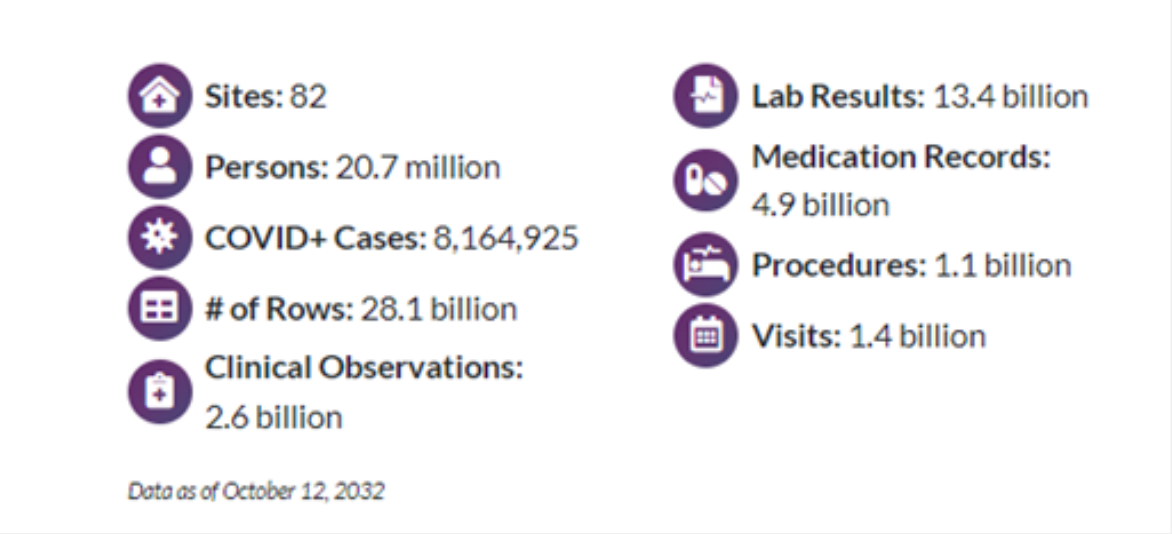The National COVID Cohort Collaborative (N3C) Data Enclave is a secure platform through which harmonized clinical data provided by our contributing members are stored. The enclave includes demographic and clinical characteristics of patients who have been tested for or diagnosed with COVID-19, and further information about the strategies and outcomes of treatments for those suspected or confirmed to have the virus.
Mission: To highlight CTR involvement with the National COVID Cohort Collaborative (N3C), to entice and promote junior investigators to learn to utilize the N3C with a mentor and provide resources for using the N3C data enclave.
IDeA-CTR Investigator Engagement Event : A Primer for IDeA-CTR Investigators on Accessing and Using N3C
November 14th, 2023, 6:00pm EST
Objectives
- What is the N3C?
- How much data is available, where is coming from, and how do you access it?
- Data access levels available?
- Resources available within the Enclave?

CTR N3C Engagement
CTR N3C Navigators
Each CTR has a N3C Navigator to assist researchers with the creation of N3C enclave accounts, Data Use Request (DUR) submissions, and other administrative clinical needs. If you have questions or need assistance, contact your CTR’s N3C Navigator from the table below.
| Site | Investigator Navigator | |
| CAMC | Mary Emmett | mary.emmett@camc.org |
| DE | Suzanne McCahan | suzanne.mccahan@nemours.org |
| LA | Brian Melancon | brian.melancon@pbrc.edu |
| ME | Kim Murray | kimberly.murray@mainehealth.org |
| MW | Joseph Guerrero Lopez | joseph.guerrerolopez@unlv.edu |
| NE | Carol Geary | carolr.geary@unmc.edu |
| ND/SD | Kent Ripplinger | kent.p.ripplinger.2@und.edu |
| RI | Jonah Bradenday | n3c-ri@brown.edu |
| WV | Sharon Patrick | patricks@hsc.wvu.edu |
| PR | Mary Helen Mays Serpan | mary.mays@upr.edu |
| VT | Jonathan Emery | jonathan.f.emery@uvm.edu |
Researcher’s Guide to N3C
N3C and several CTR authors have contributed to the Researcher’s Guide to N3C: A National Resource for Analyzing Real-World Health Data.
Special Thanks to these CTR authors:
Chapter 1: Karen Crowley-RI
Chapter 2: Will Beasley (OK), Jerrod Anzalone (NE), Sharon Patrick (WV)
Chapter 5: Sharon Patrick (WV), Jonathan Emery (VT), Suzanne McCahan (DE), Mary Helen Mays (PR)
Chapter 10: Mary Emmett (CAMC-WV), Jerrod Anzalone (NE)
Also, would like to express sincere appreciation to Will Beasley (OK) for his exceptional contributions behind the scenes in formatting the guide. His dedication and attention to detail have been invaluable, and his work has greatly enhanced the quality of the project.
N3C Onboarding
Create Enclave account
- Confirm your institution has a Data Use Access (DUA)
- An N3C Data Use Agreement (DUA) is executed by National Center for Advancing Translational Sciences (NCATS) and a research institution (or directly with a researcher in the case of a citizen scientist who is not affiliated with an institution). To submit a DUA to NCATS, institutions can download the N3C DUA form and email it to NCATS Partnerships.
Note: DUAs can only be signed by Authorized Institutional Officials who have the authority to bind all users at their institution to the terms of the DUA. With the exception of citizen scientists not associated with institutions, individual researchers cannot sign their own DUAs with NCATS.
- An N3C Data Use Agreement (DUA) is executed by National Center for Advancing Translational Sciences (NCATS) and a research institution (or directly with a researcher in the case of a citizen scientist who is not affiliated with an institution). To submit a DUA to NCATS, institutions can download the N3C DUA form and email it to NCATS Partnerships.
- Use your institutional email related to the DUA.
- ORCiD is required.
- Download a two-factor authentication app on your smartphone or tablet.
- Acceptable apps include DUO, Free OTP, Google Authenticator, and Microsoft Authenticator.
- Complete NIH security training.
- Each individual data user must complete only the first course on the list titled: 2021 Information Security consisting of these 5 modules.
- Complete Human Subjects Research Protection training in alignment with your institution’s policies.
- NIH Required Education in the Protection of Human Research Participants or CITI Program courses may be used to complete your required training; consult your Human Research Protection Program (HRPP) for your institution’s specific requirements.
- Verify completion of all the requirements for gaining access to the enclave with the N3C Registration Checklist.
- Connect with a CTR N3C Investigator Navigator.
Option 1) Create a new project: Connect with a CTR N3C Investigator Navigator
- Confirm with your local Institutional Review Board (IRB) for policies related to data levels.
- Log in to the enclave.
- You will need the date of your Human Subjects Protection Training completion.
- Click “Data Use Request (DUR)” as shown below:

- Click “Create a New Project.”
- Once you create a new project, you will be asked if you want to allow others to join the project OR if you prefer to not have collaborators at this step (as shown below). You will be able to change this later.

- You can add collaborators to your project in this phase. You will need the collaborators’ emails in order to add them to the project.
- Complete all the required attestations.
Option 2) Join an Existing Project
- Confirm with local Institutional Review Board (IRB) for policies related to data levels.
- Log in to the enclave.
- You will need the date of your Human Subjects Protection Training completion.
- Click “Data Use Request (DUR)” as shown below:

- Click the button requesting to become a collaborator (as shown below).

- Search for the project by the name of the Principal Investigator (PI) or title of the project.
- When you’ve found the project, click the button “Request to Join” (as shown below).

- If the project is using limited data sets (LDS), you will need to have local Institutional Review Board (IRB) approval and/or follow your local Institutional Review Board (IRB) approval process.
- You will receive a notification from N3C once approval has been granted. After approval, please allow approximately 5 (five) days for a workspace to be provisioned.
CTR N3C Data Use Requests
Data Use Requests (DURs) are what a researcher will submit in the enclave to gain access to a data workspace.
A Data Use Request (DUR) is an online application submitted by the researcher within the N3C Data Enclave that describes the scope and nature of the project and justifies the requested data access tier. Approval of the DUR by the Data Access Committee (DAC) is required before a researcher can access data within the enclave. (Approved DURs are valid for 1 year.) The following steps outline the process for a researcher to either submit a DUR for a new project or join an existing project.
CTR N3C Domain Teams
A Domain Team is where a researcher will attend meetings with clinicians that are in the same clinical domain or expertise.
N3C Domain Teams enable researchers with shared interests to analyze data within the N3C Data Enclave and collaborate more efficiently in a team science environment. These teams provide an opportunity to collect pilot data for grant submissions, train algorithms on larger datasets, inform clinical trial design, learn how to use tools for large scale COVID-19 data, and validate results. Domain Teams are enabled by Slack channels for discussion, meetings, and document management and are supported by N3C workstreams. N3C encourages researchers of all levels to join a Domain Team that represents their interests or to suggest new clinical areas to explore. A Domain Team can submit one or more research projects, but collaboration is encouraged for similar concepts.
CTR Domain Teams
Cardiovascular Diseases
The mission of the Cardiovascular Disease Clinical Domain Team is to better understand the effects of COVID-19 on patients with new and existing cardiovascular disease including, but not limited to, acute myocardial infarction, congestive heart failure, stroke, and coronary artery disease to determine the effect of COVID-19 on outcomes including mortality, hospitalization, and access to care.
Cardiothoracic and Vascular Surgery
The Cardiothoracic and Vascular Surgery Domain Team seeks to establish risk factors for morbidity and mortality in COVID-19 patients who underwent cardiothoracic surgical procedures.
GIS and Spatial Epidemiology
The mission of the GIS and Spatial Epidemiology (GSE) Domain will be to facilitate the technical implementation of basic and advanced GIS and spatial statistical methods within the National COVID Cohort Collaborative database. Our group will also provide expertise to other domains interested in applying spatial statistical or epidemiological methods within the scope of their work.
Immunosuppressed or Compromised (ISC)
The Immunosuppressed/Compromised (ISC) Clinical Domain Team aims to gain a better understanding of how COVID-19 affects patient populations with suppressed or compromised immune systems. The initial research will focus on a subset of target populations, including persons with HIV, solid organ transplant patients, and patients with autoimmune disorders, including skin diseases such as atopic dermatitis and eczema. The team will also identify areas of research for the ISC populations that will require additional in-depth study at a level that the N3C data may not be able to provide. Through this research, a better understanding will be gained for how various types, levels, and durations of immunosuppression or compromise contribute towards ISC patient outcomes upon COVID-19 infection. The Immunosuppressed/Compromised (ISC) Domain Team is comprised of several self-organizing subdomain teams that lead research in their specific specialties and projects. These teams focus on researching the impact of COVID-19 on particular subsets of the ISC population. For more information on the ISC Domain Team, their work within the N3C Data Enclave, and their associated subdomain teams, view the recorded ISC presentations.
Lifespan Disabilities
The mission of the Lifespan Disabilities Domain Team is to advance practices and policies that improve the education, access, and health of all people with developmental and other disabilities, as well as their families, by examining extent to which individuals with disabilities have been affected by COVID-19 diagnoses and access to appropriate treatments and follow up.
Pediatric
The Pediatrics Clinical Domain Team aims to study the unique impact of COVID-19 on children from birth to young adulthood.
Perioperative
The Perioperative Domain Team is focused on understanding the impact of COVID-19 on the treatment and outcomes of surgical patients. The domain team’s goal is to better understand the role COVID-19 plays in relation to the management of surgical patients. The Perioperative Domain Team seeks to develop evidence that is directly relevant to the perioperative surgical complications post-COVID diagnosis. This information may provide surgical teams a better understanding of the associated risks and implement plans that improve surgical outcomes.
Rural Health
The Rural Health Domain Team seeks to understand the epidemiology, utilization, treatment, and outcomes of the COVID-19 pandemic in rural communities. The overarching goal is to develop better evidence for potential differences in the COVID-19 epidemic response and outcomes for rural health care centers and rural dwellers. Studying the at-risk populations and unique challenges faced by rural communities during and after the pandemic may provide opportunities for improving rural health and health care.
CTR N3C Publications
Sex differences in clinical determinants of COVID-19 mortality – findings from the National COVID Cohort Collaborative (N3C)
Authors: Yilin Yoshida, San Chu, Sarah Fox, Yuanhao Zu, Dragana Lovre, Joshua L. Denson, Lucio Miele, Franck Mauvais-Jarvis
CTR Affiliation: LACATS
Journal: BMC Infectious Diseases
Link to Published Paper
COVID-19 in Solid Organ Transplantation: Results of the National COVID Cohort Collaborative
Authors: Amanda J. Vinson, Gaurav Agarwal, Ran Dai, Alfred J. Anzalone, Stephen B. Lee, Evan French, Amy Olex, Vithal Madhira, Roslyn B. Mannon
CTR Affiliation: Great Plains
Journal: Transplantation Direct
Link to Published Paper
Sex and Organ-Specific Risk of Major Adverse Renal or Cardiac Events in Solid Organ Transplant Recipients with COVID-19
Authors: Amanda J. Vinson, Ran Dai, Guarav Agarwal, Alfred J. Anzalone, Stephen B. Lee, Evan French, Amy L. Olex, Vithal Madhira, Roslyn B. Mannon
CTR Affiliation: Great Plains
Journal: American Journal of Transplant
Link to Published Paper
Characterizing Long COVID: Deep Phenotype of a Complex Condition
Authors: Rachel R Deer, Madeline A. Rock, Nicole Vasilevsky, Leigh Carmody, Halie Rando, Alfred J. Anzalone1, Marc D. Basson2, Tellen D. Bennett, Timothy Bergquist, Eilis A. Boudreau, Carolyn T. Bramante, James Brian Byrd, Tiffany J. Callahan, Lauren E. Chan, Haitao Chu, Christopher G. Chute, Ben D. Coleman, Hannah E. Davis, Joel Gagnier, Casey S. Greene, William B. Hillegass3, Ramakanth Kavuluru, Wesley D. Kimble4, Farrukh M. Koraishy, Sebastian Köhler, Chen Liang, Feifan Liu, Hongfang Liu, Vithal Madhira, Charisse R. Madlock-Brown, Nicolas Matentzoglu, Diego R. Mazzotti, Julie A. McMurry, Douglas S. McNair, Richard A. Moffitt, Teshamae S. Monteith, Ann M. Parker, Mallory A. Perry, Emily Pfaff, Justin T. Reese, Joel Saltz, Robert A. Schuff, Anthony E. Solomonides, Julian Solway, Heidi Spratt, Gary S. Stein5, Anupam A. Sule, Umit Topaloglu, George D. Vavougios, Liwei Wang, Melissa A. Haendel, Peter N. Robinson
CTR Affiliation: 1Great Plains, 2DaCCota, 3MCCTR, 4WVCTSI, 5Northern New England CTRN
Journal: eBioMedicine, Part of The Lancet Discovery Science
Link to Published Paper
Association Between Immune Dysfunction and COVID-19 Breakthrough Infection following Vaccination in the United States: A Cohort Study from a Nationally Sampled Database
Authors: Jing Sun, Qulu Zheng, Vithal Madhira
CTR Affiliation: Great Plains
Journal: JAMA Internal Medicine
Link to Published Paper
Higher hospitalization and mortality rates among SARS-CoV-2-infected persons in rural America.
Authors: Alfred Jerrod Anzalone1, Ronald Horswell2, Brian M. Hendricks3, San Chu, William B. Hillegass4, William H. Beasley5, Jeremy R. Harper, Wesley Kimble3, Clifford J. Rosen6, Lucio Miele2, James C. McClay1, Susan L. Santangelo6, Sally L. Hodder3, National COVID Cohort Collaborative (N3C) Consortium
CTR Affiliation: 1Great Plains, 2LACATS, 3WVCTSI, 4MCCTR, 5OSCTR, 6NNECTRN
Journal: Journal of Rural Health
Link to Published Paper
Impact of malnutrition on clinical outcomes in patients diagnosed with COVID-19
Authors: Jana Ponce, Alfred Jerrod Anzalone, Kristina Bailey, Harlan Sayles, Megan Timmerman, Mariah Jackson, James McClay, Corrine Hanson, National COVID Cohort Collaborative (N3C) Consortium
CTR Affiliation: Great Plains
Journal: Journal of Parenteral and Enteral Nutrition
Link to Published Paper
The risk and consequences of breakthrough SARS-CoV-2 infection in solid organ transplant recipients relative to non-immunosuppressed controls
Authors: Amanda J. Vinson, Alfred J. Anzalone, Jing Sun, Ran Dai, Gaurav Agarwal, Stephen B. Lee, Evan French, Amy Olex, Michael G. Ison, Roslyn B. Mannon, National COVID Cohort Collaborative (N3C) Consortium
CTR Affiliation: Great Plains
Journal: American Journal of Transplantation
Link to Published Paper
COVID-19 patients with documented alcohol use disorder or alcohol-related complications are more likely to be hospitalized and have higher all-cause mortality.
Authors: Kristina L. Bailey, Harlan Sayles, James Campbell, Neha Khalid, Madyson Anglim, Jana Ponce, Todd A. Wyatt, James C. McClay, Ellen L. Burnham, Alfred Anzalone, Corrine Hanson
CTR Affiliation: Great Plains
Journal: Alcoholism: Clinical and Experimental Research
Link to Published Paper
An ordinal severity scale for COVID-19 retrospective studies using Electronic Health Record data
Authors: Maryam Khodaverdi1, Bradley S. Price1, J. Zachary Porterfield, H. Timothy Bunnell2, Michael T. Vest2, Alfred Jerrod Anzalone3, Jeremy Harper, Wes D. Kimble1, Hamidreza Moradi4, Brian Hendricks1, Susan L. Santangelo5, Sally L. Hodder1
CTR Affiliation: 1WVCTSI, 2ACCEL, 3Great Plains, 4MCCTR, 5NNECTRN
Journal: JAMIA Open
Link to Published Paper
Association of Vitamin D Prescribing and Clinical Outcomes in Adults Hospitalized with COVID-19
Authors: Kathleen M. Fairfield1, Kimberly A. Murray1, Alfred Jerrod Anzalone2, William Beasley3, Maryam Khodaverdi4, Sally L. Hodder4, Jeremy Harper, Susan Santangelo1, Clifford J. Rosen1, National COVID Cohort Collaborative (N3C) Consortium
CTR Affiliation: 1NNECTRN, 2Great Plains, 3OSCTR, 4WVCTSI
Journal: Nutrients
Link to Published Paper
Community Risks for SARS-CoV-2 Infection Among Fully Vaccinated US Adults by Rurality: A Retrospective Cohort Study from the National COVID Cohort Collaborative
Authors: Alfred J. Anzalone1, Jing Sun, Amanda J. Vinson, William H. Beasley2, William B. Hillegass3, Kimberly Murray4, Brian M Hendricks5, Melissa Haendel, Carol Reynolds Geary, Kristina L. Bailey, Corrine K. Hanson, Lucio Miele6, Ronald Horswell6, Julie A. McMurry, J. Zachary Porterfield, Michael T. Vest7, H. Timothy Bunnell7, Jeremy R. Harper, Bradley S. Price5, Susan L. Santangelo4, Clifford J. Rosen4, James C. McClay1, Sally L. Hodder5; National COVID Cohort Collaborative (N3C) Consortium
CTR Affiliation: 1Great Plains, 2OSCTR, 3MCCTR, 4NNECTRN, 5WVCTSI, 6LACATS, 7ACCEL
Journal: PLOS ONE
Link to Published Paper
Assessing the Effects of Therapeutic Combinations on SARS-CoV-2 Infected Patient Outcomes: A Big Data Approach
Authors: Hamidreza Moradi1, H. Timothy Bunnell2, Bradley S. Price3, Maryam Khodaverdi3, Michael T. Vest2, James Z. Porterfield, Alfred J. Anzalone4, Susan L. Santangelo5, Wesley Kimble3, Jeremy Harper, William B. Hillegass1, Sally L. Hodder3; National COVID Cohort Collaborative (N3C) Consortium
CTR Affiliation:1MCCTR, 2ACCEL, 3WVCTSI, 4GPCTR, 5NNECTRN
Journal: PLOS ONE
Link to Published Paper
Additional Information
- N3C Cohort Exploration
- N3C Training
- N3C Tutorials
- Building a COVID-19 Analytics Platform to Turn Clinical Data into Knowledge: Introducing the National COVID Cohort Collaborative
- N3C Code of Conduct
- Policies, Agreements, Forms
- N3C Publication Committee and Review
- Download Policy
- External Datasets
- Data Dictionary
- Domain Roles and Information
- Intro to Observational Medical Outcomes Partnership (OMOP) and Contour
- Concept Set Tools
- Crash Course in OMOP
** Reminder: Do not share enclave data with others who do not have enclave access. Also, screenshots of the data within the enclave are not permitted.




